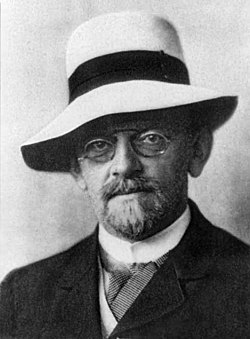probability theory, Kolmogorov's two-series theorem is a result about the convergence of random series. It follows from Kolmogorov's inequality and is used...
3 KB (585 words) - 06:34, 14 April 2025
theory, Kolmogorov's three-series theorem, named after Andrey Kolmogorov, gives a criterion for the almost sure convergence of an infinite series of random...
6 KB (979 words) - 10:43, 8 May 2025
filter Kolmogorov's two-series theorem Rao–Blackwell–Kolmogorov theorem Khinchin–Kolmogorov theorem Kolmogorov population model Kolmogorov's Strong Law...
31 KB (2,789 words) - 10:11, 26 June 2025
real analysis and approximation theory, the Kolmogorov–Arnold representation theorem (or superposition theorem) states that every multivariate continuous...
27 KB (4,101 words) - 06:34, 28 June 2025
Evaluating Kolmogorov's Distribution; contains C implementation. This is the method used in Matlab. Paper on Computing the Two-Sided Kolmogorov–Smirnov Distribution;...
31 KB (3,909 words) - 09:43, 9 May 2025
revised in December 1968, and cites both Solomonoff's and Kolmogorov's papers. The theorem says that, among algorithms that decode strings from their...
60 KB (7,894 words) - 12:09, 23 June 2025
Glivenko–Cantelli theorem Zero–one law Kolmogorov's zero–one law Hewitt–Savage zero–one law Law of truly large numbers Littlewood's law Infinite monkey theorem Littlewood–Offord...
11 KB (1,000 words) - 14:07, 2 May 2024
Fourier inversion theorem Fourier sine and cosine series Fourier transform Gibbs phenomenon Half range Fourier series Laurent series – the substitution...
72 KB (11,152 words) - 11:43, 12 June 2025
Karhunen–Loève theorem (stochastic processes) Kolmogorov extension theorem (stochastic processes) Kolmogorov's three-series theorem (mathematical series) Le Cam's...
78 KB (6,289 words) - 12:34, 6 June 2025
Probability axioms (redirect from Kolmogorov's axioms)
formalising probability. Bayesians will often motivate the Kolmogorov axioms by invoking Cox's theorem or the Dutch book arguments instead. The assumptions...
11 KB (1,619 words) - 04:30, 19 April 2025
arXiv:2101.05390. Hecht-Nielsen, Robert (1987). "Kolmogorov's mapping neural network existence theorem". Proceedings of International Conference on Neural...
39 KB (5,225 words) - 05:12, 2 June 2025
Law of large numbers (redirect from Kolmogorov's Second Law of Large Numbers)
[X_{k}]<\infty .} This statement is known as Kolmogorov's strong law, see e.g. Sen & Singer (1993, Theorem 2.3.10). The weak law states that for a specified...
45 KB (6,394 words) - 13:13, 25 June 2025
In information theory, Shannon's source coding theorem (or noiseless coding theorem) establishes the statistical limits to possible data compression for...
12 KB (1,881 words) - 21:05, 11 May 2025
In probability theory, the central limit theorem (CLT) states that, under appropriate conditions, the distribution of a normalized version of the sample...
67 KB (9,202 words) - 03:48, 9 June 2025
Wiener–Khinchin theorem or Wiener–Khintchine theorem, also known as the Wiener–Khinchin–Einstein theorem or the Khinchin–Kolmogorov theorem, states that...
14 KB (1,803 words) - 06:35, 14 April 2025
interpolation theorem. For p = 1 and infinity, the result is not true. The construction of an example of divergence in L1 was first done by Andrey Kolmogorov (see...
23 KB (4,043 words) - 04:16, 14 January 2025
Algorithmic information theory (redirect from Kolmogorov-Chaitin information theory)
the probability of future events based on past events Invariance theorem Kolmogorov complexity – Measure of algorithmic complexity Minimum description...
24 KB (2,805 words) - 20:23, 27 June 2025
Gödel's incompleteness theorems are two theorems of mathematical logic that are concerned with the limits of provability in formal axiomatic theories...
92 KB (12,173 words) - 02:29, 24 June 2025
Ergodic theory (redirect from Ergodic theorem)
random variables and some more general stationary processes follows from Kolmogorov's zero–one law. Ergodicity of a continuous dynamical system means that...
26 KB (3,727 words) - 14:43, 28 April 2025
Euclid's theorem is a fundamental statement in number theory that asserts that there are infinitely many prime numbers. It was first proven by Euclid...
22 KB (3,427 words) - 16:29, 19 May 2025
Hewitt–Savage zero–one law (category Theorems in probability theory)
The Hewitt–Savage zero–one law is a theorem in probability theory, similar to Kolmogorov's zero–one law and the Borel–Cantelli lemma, that specifies that...
5 KB (692 words) - 06:33, 14 April 2025
In probability theory, the central limit theorem states that, under certain circumstances, the probability distribution of the scaled mean of a random...
18 KB (2,643 words) - 11:58, 1 May 2025
Bayes' theorem (alternatively Bayes' law or Bayes' rule, after Thomas Bayes) gives a mathematical rule for inverting conditional probabilities, allowing...
49 KB (6,809 words) - 10:33, 7 June 2025
Turbulence (redirect from Kolmogorov's theory of 1941)
boundaries (the size characterizing the large scales will be denoted as L). Kolmogorov's idea was that in the Richardson's energy cascade this geometrical and...
47 KB (5,606 words) - 22:49, 19 June 2025
Fourier transform (redirect from Fourier shift theorem)
these formulas is not quite standardised. Parseval's theorem was proved only for Fourier series, and was first proved by Lyapunov. But Parseval's formula...
177 KB (21,313 words) - 02:31, 2 June 2025
Entscheidungsproblem (redirect from Church's Theorem)
impossible by Alonzo Church and Alan Turing in 1936. By the completeness theorem of first-order logic, a statement is universally valid if and only if it...
19 KB (2,642 words) - 21:03, 19 June 2025
with any algebraic numerical coefficients 12. Extensions of Kronecker's theorem on Abelian fields to any algebraic realm of rationality 13. Impossibility...
41 KB (3,685 words) - 21:43, 21 June 2025
Cox's theorem, named after the physicist Richard Threlkeld Cox, is a derivation of the laws of probability theory from a certain set of postulates. This...
15 KB (2,382 words) - 13:22, 9 June 2025
Completeness (statistics) (redirect from "complete class theorem")
statistic which is not complete. This is important because the Lehmann–Scheffé theorem cannot be applied to such models. Galili and Meilijson 2016 propose the...
10 KB (1,548 words) - 16:15, 10 January 2025
Measure-preserving dynamical system (redirect from Kolmogorov entropy)
in particular. Measure-preserving systems obey the Poincaré recurrence theorem, and are a special case of conservative systems. They provide the formal...
23 KB (3,592 words) - 05:13, 10 May 2025









